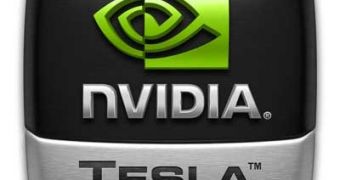Santa Clara, California-based NVIDIA has announced today that Evolved Machines Inc has chosen the Tesla GPU computing processors for their latest computing facility, designed for the development of artificial neural circuits. According to the graphics maker, the new system boasts an impressive 10,800 parallel computing cores, combined with 14 quad-core AMD Phenom processors, which can deliver a nominal computing capacity of over 40 TFLOPS. This impressive computing facility is meant to enable a higher level of performance, required by the simulation of the mechanisms embedded in the biological neural circuitry.
“The complex mechanisms embedded in biological neural circuitry enable the extraordinary capabilities of the brain,” said Paul A. Rhodes, Ph.D., CEO of Evolved Machines. “The simulation of these mechanisms requires an enormous amount of parallel computing power and we get that from NVIDIA GPU Computing technology. With this new GPU-enabled facility, we expect our work to be able to guide the development of artificial neural circuits which will lie at the heart of a new generation of devices in artificial olfaction and vision.”
Unlike NVIDIA's GeForce and Quadro graphics lineups, the Tesla product family is specifically designed to provide professionals with a high level of performance inside a GPGPU (General Purpose Graphics Processing Unit) computing environment. The product enables users to take advantage of the GPU’s many cores to boost the performance of their high-end systems and provide a better solution for complicated calculations. This is also the case with Evolved Machines, which is basically trying to decipher the complex mechanisms of the human brain.
“Evolved Machines was one of the first companies to recognise the enormous potential of the GPU to solve large complex problems,” said Andy Keane, general manager, Tesla business at NVIDIA. “There is perhaps no greater challenge than creating a machine that behaves like a human brain, so we are excited to see what advances in neural science Evolved Machines can make with their new facility.”

 14 DAY TRIAL //
14 DAY TRIAL //